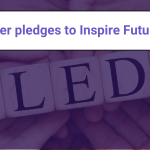Mark Roberts Photography explains how to pursue a career in the Creative Industries.
Interested in turning your creative passion into a career? Photographer, videographer, and YouTuber Mark Roberts shares exactly how he did it and how students can do the same.
In this Sector Spotlight from The Changing Education Group, Mark offers an inside look at life behind the lens, what it takes to stand out in a creative career, and why persistence and passion matter more than expensive gear.
Who is Mark Roberts, and what can students learn from his journey?
Mark Roberts is a professional photographer, filmmaker, and content creator who built his career by doing what he loves, and doing it well.
He studied Audio and Visual Technology at university, but says the best way to start is to get hands-on. You don’t need a degree to build a career in the creative industries; you need a camera, commitment, and time to refine your skills.
“The number one thing you can do is perfect your craft. If you become great at what you do, people will see value in that and want to add value to you.”
– Mark Roberts
What does a career in photography or videography look like?
Creative careers are broad, flexible, and often freelance, meaning students can shape their path. From personal branding to commercial photography and social media content, there are many routes to explore.
Common roles in this sector:
- Photographer (portrait, fashion, events, product, travel)
- Videographer and film editor
- Content creator or YouTuber
- Social media marketer or brand consultant
- Creative director or visual storyteller
Mark’s path combines technical skills with entrepreneurship, showing students that a successful creative career can be built step-by-step, not overnight.
What advice does Mark offer students interested in creative careers?
Mark’s message is simple: focus on your craft, invest in yourself, and don’t give up.
His top tips for young creatives:
- Start now: Buy a camera or use your phone. Take photos, make videos, and practise daily.
- Find your people: Follow creators you admire and learn from them.
- Use free resources: YouTube is packed with tutorials, courses, and creative challenges.
- Invest in yourself: Your time, effort, and consistency show others you’re worth backing.
- Be patient: Success takes time. Progress might be slow, but it’s still progress.
Creative careers can be unpredictable, but for students with a genuine passion, the rewards can be exciting, fulfilling, and limitless.
How does this support careers education in UK schools?
Mark’s interview supports Gatsby Benchmarks 4 and 5, helping schools link curriculum to careers and provide engaging encounters with industry professionals.
It also:
- Inspires students interested in arts, media, and digital technologies
- Encourages self-directed learning and resilience
- Highlights alternative pathways into creative industries
- Shows that passion and persistence are just as important as qualifications
Through The Changing Education Group’s Sector Spotlights and employer engagement, schools can help students explore creative careers with clarity and confidence.
Build Your Creative Future, One Step at a Time
Mark Roberts shows students that creative careers are achievable, accessible, and exciting. With the right mindset and consistent practice, young people can turn passion into a profession and shape their path into the creative industries.
Want your students to hear more stories like Mark’s?
Book a demo and discover how our Work Experience Suite brings real industry voices into the classroom, helping young creatives feel inspired, informed, and ready.
FAQs
What are the creative industries?
The creative industries include photography, film, media, design, content creation, advertising, and digital storytelling, offering a wide range of careers for artistic and visual thinkers.
Do I need a degree to work in photography or video?
Not necessarily. While some study creative arts at university, many professionals are self-taught and grow their careers through practice, portfolio work, and online learning.
What’s the best way to start a creative career?
Start by practising regularly, learning from others, and using free platforms like YouTube to build your skills. Then share your work, take feedback, and improve.
How does this support Gatsby Benchmarks?
It supports Benchmark 4 (linking curriculum to careers) and Benchmark 5 (encounters with employers) through a real-world story from the creative sector.
Can schools access more videos like this?
Yes, The Changing Education Group provides a full library of Sector Spotlight videos and career insight content as part of its Work Experience Suite.







